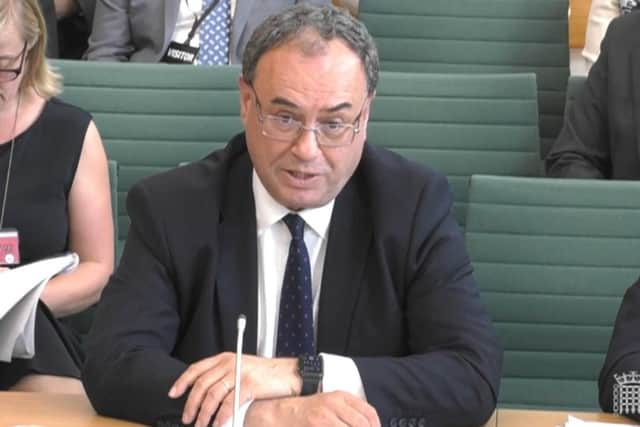People are changing their buying habits
and live on Freeview channel 276
This week he was lucky enough to escape to a conference of European bankers in Portugal. There his message was that if they had cause to be gloomy, they could be even worse off by being in his position.
Inevitably the debate was dominated by inflation and by the inevitability of further interest rate rises. Bailey said he believed inflation in the UK would continue to rise and that it would fall more slowly in the UK than for any other economy. Add into that the UK is the only developed economy, other than Russia, with a forecast for 2023 of zero growth and it is clear we need to strap in for a bumpy ride.
Advertisement
Advertisement
Bailey said the cause of inflation had changed in recent months – from demand chasing supplies after Covid restrictions were first eased to the current situation where it is being driven by rising costs linked to the war in Ukraine. This means the cause has switched from relatively healthy and easily controlled by interest rates demand pull inflation, to the much more insidious cost push we now have.


How this will affect farming depends ultimately on whether rising costs can be passed on to consumers. This is far from certain as there is already evidence people are changing their buying habits. People are shopping more often but buying less; there has been a big switch from brands to cheaper own label products and from the traditional big retailers to the discount stores. Costs will continue to rise in the food industry, led by grain, energy and labour costs, but retailers will battle to limit price increases. This is why inflation is dubbed the thief of prosperity. The gloomy news that it will be even worse in the UK than elsewhere is news no-one wanted to hear.
It is hard to believe, and impossible to calculate, how much the world has changed in recent months. Geopolitically we are back to the stand off Iron Curtain days of the 1960s; food shortages are real and getting worse and many of the certainties we took for granted have gone. Food is a prime example. Twelve months ago people viewed food security as an irrelevance and that was the view of many UK politicians. Today it is top of the agenda. The EU has just undertaken a survey across all member states of what people see as the priority of the CAP. Over 50 per cent now say its primary aim should be to deliver a secure food supply in Europe. This is well up on a previous survey in 2020 and it is a figure that will rise as concerns about food availability grow.
Over 55 per cent saw the main focus of the CAP as the delivery of affordable food. When asked if the CAP delivered food security almost 80 per cent said it did. Inevitably, given that the questions were drafted by the European Commission, there was a green element to the conclusions. Two thirds believed farmers could do more to mitigate climate change; 90 per cent said extreme weather linked to climate change affected food security. Crucially a very high 90 per cent also deemed rural areas important to their future, even if they lived in towns.
Advertisement
Advertisement
This is a positive report for European farmers, confirming that people see them as essential in the food security equation. The importance they attach to rural areas was also encouraging. This report gives the EU a base for policy making around people’s priorities. As the government continues putting green outcomes ahead of food production it would be wise to reflect the Brexit freedoms it wanted by asking people in the UK the same questions the EU put to its citizens.
I suspect politicians might then realise that in the real world food security tops all other issues. That will become even more clear as we move through this year into zero economic growth for the UK 2023. While we talk about the impact of the war in Ukraine on grain supplies, in reality those shortages have yet to bite. Supplies are still in the pipeline, even if they are blockaded, but it will only become clear with the
harvest this autumn how little Ukraine has been able to plant and how little it will have for export, even if the Russian blockades can be eased.